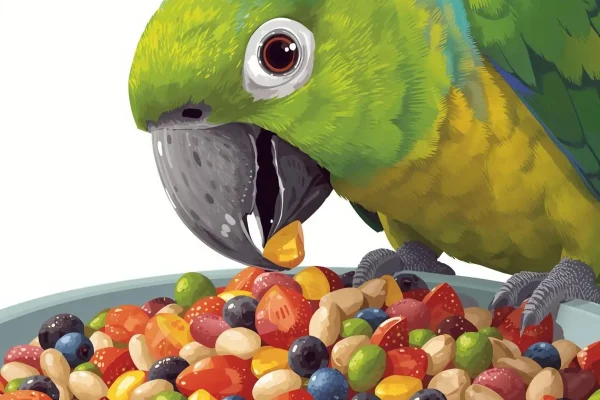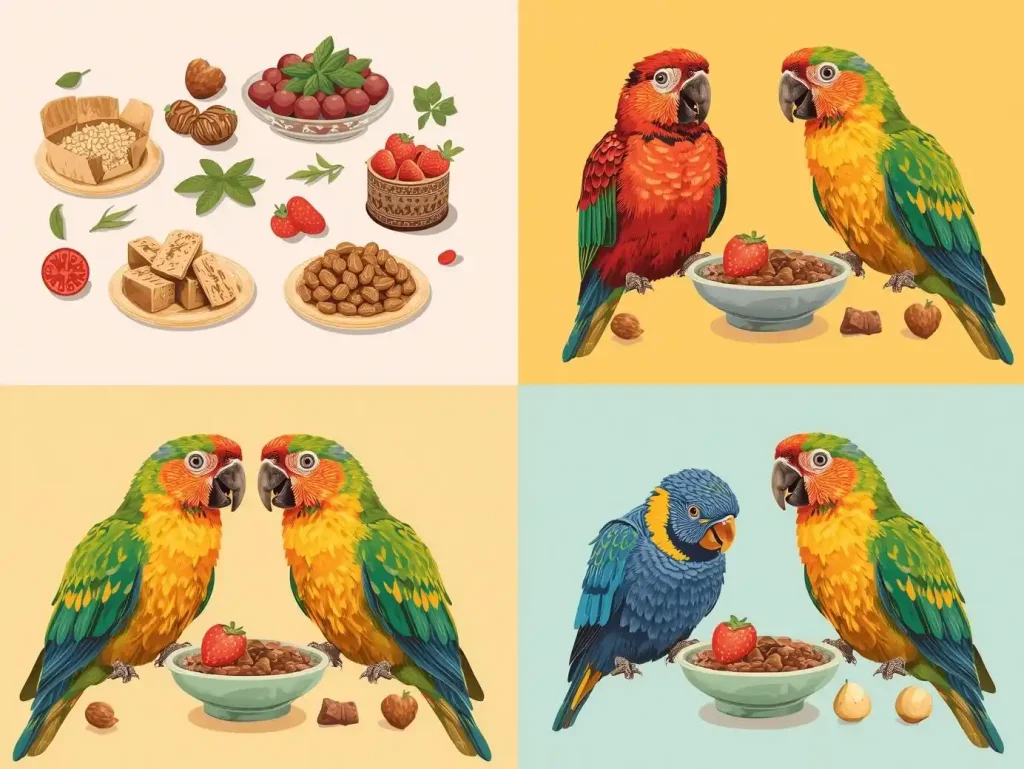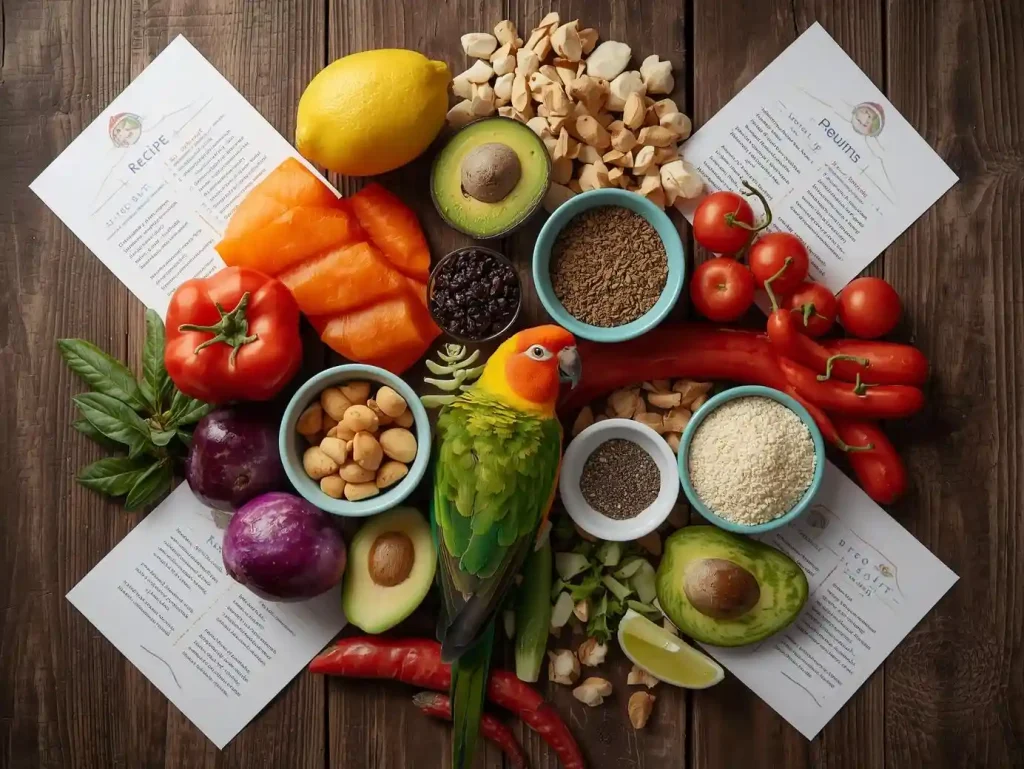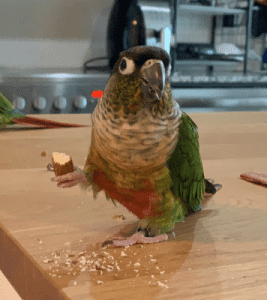
Beyond Seeds: Delicious and Nutritious Recipes Your Conure Will Love!

Are you a proud conure parent looking to spice up your feathered friend’s diet? While seeds might be a conure’s go-to snack, a truly healthy and vibrant parrot diet goes far beyond that. Just like us, conures thrive on variety and a balanced intake of fresh fruits, vegetables, grains, and even lean proteins. Not only does a diverse diet keep them physically healthy, leading to better plumage and higher energy levels, but it also provides crucial mental stimulation, enriching their lives and preventing boredom.
At Bird Sitting Toronto, we understand that proper nutrition is the bedrock of avian health. Serving the entire Toronto and GTA area, our team is dedicated to providing comprehensive care that supports a vibrant lifestyle. When you entrust your bird to us, whether for a short stay or a grooming session, we ensure their dietary routine remains consistent and tailored to their needs. We know a happy, healthy bird starts with a well-balanced diet!
Comprehensive Care Beyond the Bowl: Our Commitment to Your Bird
We don’t just focus on temporary care; we are a full-service avian resource. Beyond ensuring your conure sticks to its nutritious meal plan while you are away, Bird Sitting Toronto offers a full spectrum of specialized services to keep your feathered friend in peak condition:
- Bird Sitting: We provide reliable, loving, temporary care for all types of parrots, including Budgies, Conures, Lovebirds, Parakeets, Finches, Canaries, and more, ensuring they receive daily fresh food, water, interaction, and open flights.
- Grooming Services: Keeping your conure comfortable and safe is vital. We offer expert Nail Clipping (when nails become a snagging hazard), safe Wing Clipping (to prevent accidental flights), and gentle Beak Trimming using a low-setting dremel for birds that develop an overgrown beak.
- Avian Support: We also facilitate Bird Rehoming and offer technical services like DNA Sexing.
- Convenience: To make your life easier, we offer Cage Rentals and a convenient Drop Off/Pick Up Service. We even offer a fantastic Bird Chop Subscription to help busy owners ensure their birds always have access to fresh, nutritious food mixes.

Why Go Beyond Seeds? The Health Imperative
Before we get to the fun part, let’s briefly touch on why a seed-only diet isn’t ideal for your conure:
- Nutritional Deficiencies: Seeds are high in fat and low in essential vitamins (like Vitamin A, crucial for immune health) and minerals, leading to an unbalanced diet.
- Health Issues: Over time, a seed-heavy diet can contribute to obesity, fatty liver disease, and other serious, preventable health concerns.
- Lack of Stimulation: Foraging for diverse foods is a natural behavior for parrots. Offering a variety of textures, colours, and shapes keeps them mentally engaged and physically active.
The gold standard for a conure’s diet is a base of high-quality, species-appropriate pellets (around 60-70% of the total diet), heavily supplemented with 30-40% fresh produce, grains, and occasional healthy treats.
Conure Cuisine: Recipes Your Bird Will Adore
Here are some simple, delicious, and nutritious recipes you can prepare for your conure. Always introduce new foods gradually and in small amounts—patience is a virtue when converting a picky eater!
1. Tropical Sunrise Fruit & Veggie Bowl
This vibrant mix is packed with essential vitamins and antioxidants, perfectly mimicking the diverse bounty your conure would seek out in the wild.
Ingredients:
- 1/4 cup chopped mango (peeled and pitted)
- 1/4 cup finely chopped bell pepper (any color, seeds removed)
- 2 tablespoons cooked sweet potato (cooled and diced)
- 1 tablespoon chopped broccoli florets
- 1 tablespoon fresh kale leaves, torn
Instructions: Gently combine all ingredients. Serve a small portion (about 1-2 tablespoons) in your conure’s food dish. The natural sweetness of the mango and sweet potato can help entice birds to try the new vegetables.
2. “Garden Greens & Grains” Power Mix
This recipe provides a solid source of complex carbohydrates, fiber, and greens for sustained energy and excellent digestion.
Ingredients:
- 1/4 cup cooked quinoa or brown rice (cooled)
- 2 tablespoons shredded carrot
- 1 tablespoon cooked lentils (cooled)
- 1 tablespoon chopped zucchini
- Pinch of finely chopped fresh parsley or cilantro
Instructions: Mix all ingredients together. Quinoa and lentils are excellent sources of plant-based protein, making this a balanced mini-meal. This mix is perfect for stuffing into foraging toys to provide hours of engaging activity.
3. The “Chop” – Your Conure’s Weekly Buffet
The single best strategy for ensuring a varied diet is making a large batch of “chop”—a finely diced mixture of safe fruits, vegetables, and grains that can be prepared once a week and frozen in daily portions.
Basic Chop Ingredients (Mix & Match):
- Leafy Greens: Kale, spinach, collard greens.
- Vegetables: Broccoli, bell peppers, carrots, butternut squash, zucchini, green beans.
- Grains/Legumes: Cooked quinoa, lentils, chickpeas, brown rice.
- Fruit (Minimal): Berries, melon, small amounts of apple (no seeds).
Preparation:
- Wash all produce thoroughly and remove seeds/pits.
- Finely chop or use a food processor for a uniform mix.
- Mix well and portion into freezer-safe containers or ice cube trays.
- Thaw one portion daily and serve.

Trusted Government and Avian Health Resources
As a responsible bird owner in the Toronto and GTA area, staying informed about avian health and safety is crucial. Here are key Canadian government resources to keep handy:
- Avian Influenza (Bird Flu) Information (CFIA): The Canadian Food Inspection Agency (CFIA) is the primary federal resource for animal health emergencies, including Avian Influenza (Bird Flu). Knowing the signs and biosecurity measures is essential for all bird owners.
- Feeds Regulations (CFIA): For owners interested in the safety and quality standards of commercial bird food, the federal Feeds Regulations outline the requirements for feed products sold in Canada.
- City of Toronto – Animals & Pets: For local Toronto-specific information regarding animal bylaws, services, and coexisting with wildlife.
- Reporting Sick or Dead Wild Birds (Ontario): If you find a sick or dead wild bird, do not touch it. Report it to the Canadian Wildlife Health Cooperative (CWHC) Ontario Regional Centre. This helps monitor and control the spread of disease, protecting your conure.
- Ontario Contact: 1-866-673-4781
Important Considerations:
- Patience and Persistence: It can take many attempts for a conure to accept a new food. Keep offering small amounts daily and don’t get discouraged.
- Avoid Toxic Foods: Never feed your conure avocado (toxic), chocolate, caffeine, alcohol, onion, garlic, or fruit pits/seeds.
- Portion Control: Fresh foods should be removed from the cage after a few hours to prevent bacterial growth and spoilage.
By prioritizing these delicious and nutritious recipes, you’re investing in your conure’s longevity and happiness. And remember, for professional and compassionate avian care in the Toronto and GTA area, including expert dietary maintenance and specialized grooming, Bird Sitting Toronto is your trusted partner. Give your conure the gift of a diverse and delightful diet!
5 FAQs About Conure Diet & Nutrition
- Q: How often should I offer fresh fruits and vegetables to my conure? A: Fresh fruits and vegetables should be offered daily. They should make up about 30-40% of your conure’s total daily intake, complementing their primary diet of pellets.
- Q: My conure is very picky and only wants to eat seeds. How can I get them to try new foods? A: Start by mixing very finely chopped fresh food with a small portion of their regular seeds or pellets. Offer the fresh food in the morning when they are hungriest. Persistence is key—it can take dozens of attempts before they accept a new item.
- Q: Are there any fruits or vegetables I should absolutely avoid feeding my conure? A: Yes, absolutely avoid avocado (all parts, which are highly toxic), as well as onion, garlic, mushrooms, chocolate, caffeine, and the seeds/pits of most fruits (like apple seeds, cherry pits, etc.).
- Q: Should I cook vegetables for my conure, or are raw better? A: Both raw and lightly cooked vegetables are beneficial. Raw provides crunch and natural foraging textures, while lightly steaming tougher vegetables (like sweet potato or broccoli) can make them easier to digest and more appealing to some birds. Always serve cooked food cooled to room temperature.
- Q: What is the benefit of a “Bird Chop Subscription” from a service like Bird Sitting Toronto? A: A Bird Chop Subscription provides a weekly or bi-weekly supply of pre-made, finely diced, diverse, and nutritious chop, saving owners the time and effort of daily preparation. This ensures your conure always has access to the high-quality, varied diet necessary for optimal health, even if you are too busy to prepare it yourself.
Categories
Our Blogs


10 Common Dangers Every Bird Owner Should Know

Amherst Veterinary Hospital: Exceptional Care for Your Beloved Companions

Parrot Nail Trimming: A Step-by-Step Guide for Bird Owners
Latest News

Conure Variety: A Complete Guide for Bird Lovers in Toronto
Conures are some of the most colorful, playful, and intelligent parrots you can keep as

Bird Sitting Toronto: Safe, Loving Bird Boarding for 2026
As we welcome 2026, it’s the perfect time to highlight Bird Sitting Toronto, one of

How to Prepare Your Pet Bird for Overnight or Extended Stays in Toronto
When you need to travel or take a break from your daily routine, arranging care
